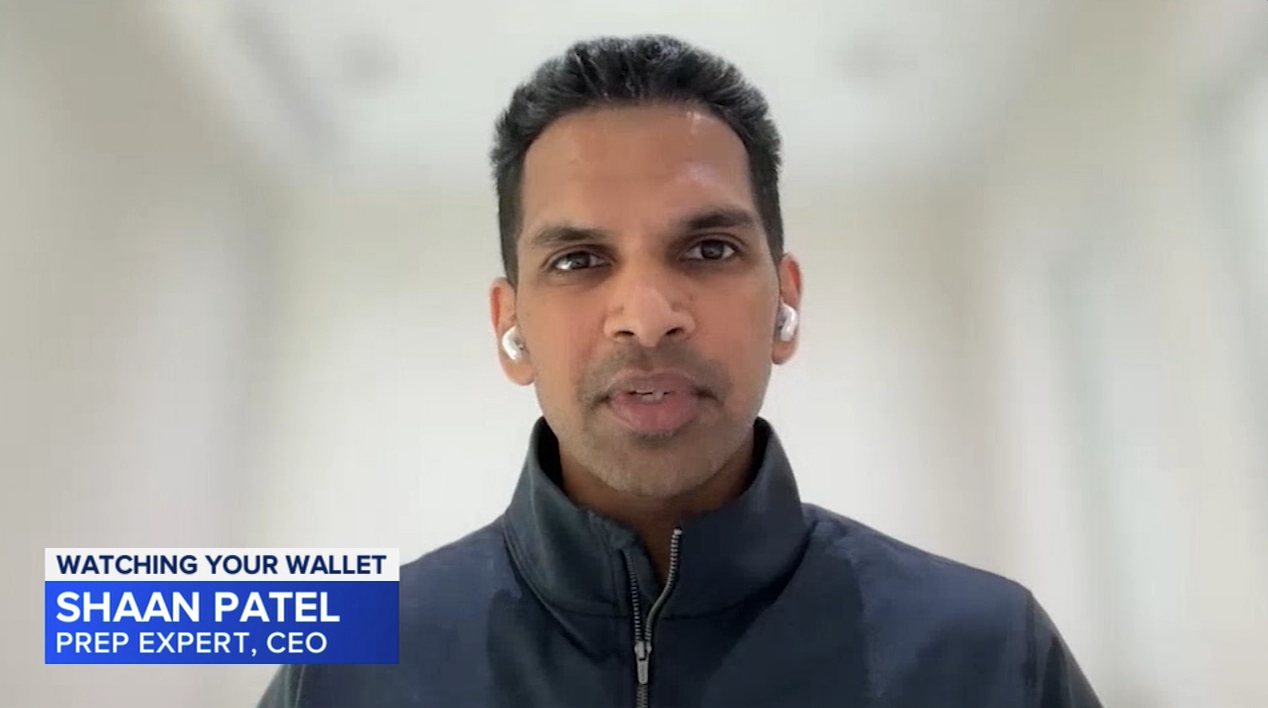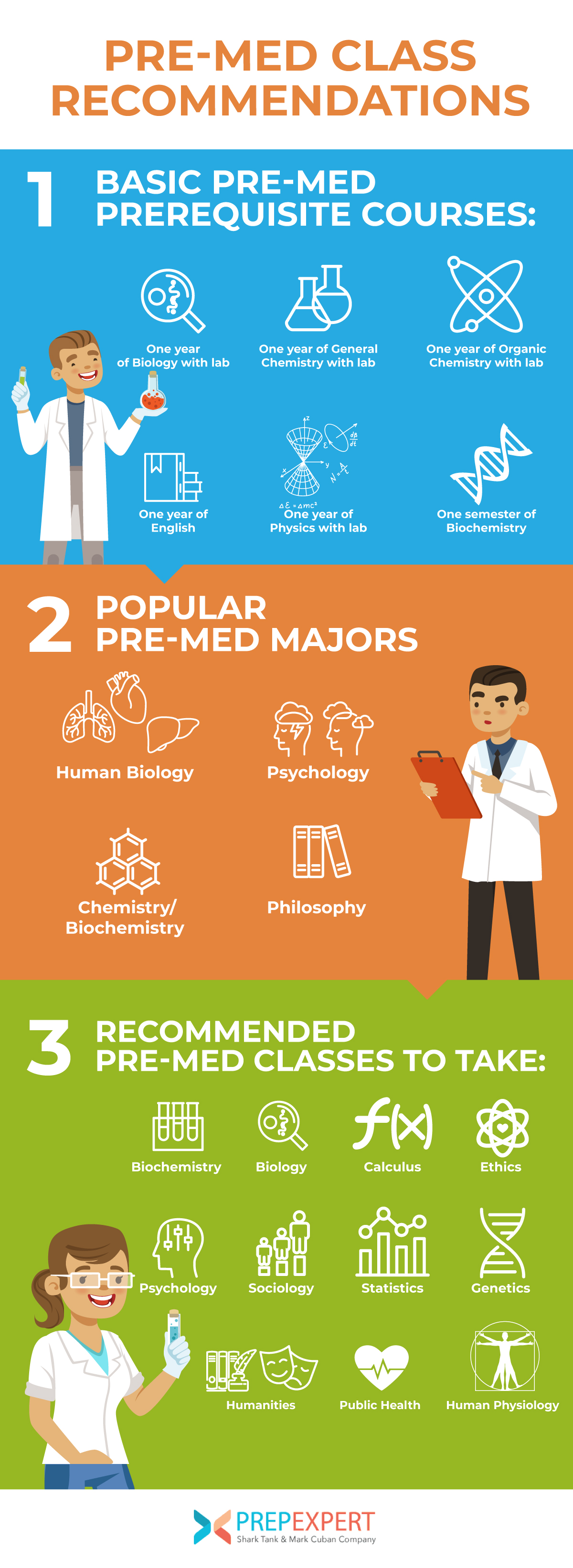Pre-Med Class Recommendations
Getting into medical school isn’t easy! It takes a lot of hard work and careful preparation to gain the knowledge and skills you need to build a strong application and succeed on the MCAT. But, you can accelerate your journey and establish a strong foundation for medical school by making sure you take the right courses during your undergrad years.
Every year, thousands of college students say that they’re “pre-med,” but that doesn’t actually mean that they’re guaranteed admission into medical school. It’s important to understand that “pre-med” is not a major. It’s an advising track. That means that there is no pre-med curriculum that is standardized across undergraduate experiences… and that is a problem. While many pre-med students declare majors like biology, chemistry, psychology, and biochemistry, only 16.5% of students who try to follow the pre-med track actually graduate college with the required coursework for medical schools. Why does this happen?
Unfortunately, many pre-med students dive into undergraduate without a full understanding of the required coursework for medical schools. While there is some degree of variability between medical schools, there are basic course requirements that most medical schools will expect incoming students to have already fulfilled during their undergraduate years.
Some of these courses are also important because they lay the groundwork for the MCAT, which is the standardized test designed to assess your readiness for medical school. The more you can prepare for the MCAT in undergraduate, the better your score will be.
This guide will help you put your best foot forward while preparing for medical school by offering up pre-med class recommendations as well as additional tips and skills you can use to improve your chances of getting into medical school, all coming straight from a medical school graduate.
Be sure to check out our various SAT prep and ACT prep course options as well as our admissions consulting services for additional college prep resources.
What Classes To Take For Medical School
If you’re planning on going to medical school in America, great news: The American Association of Medical Colleges publishes an annual Medical School Admissions Requirements report, or MSAR. Part of the MSAR is a list of course requirements for every medical school in the country. When you’re choosing courses, read over this list. As a first-year student, you might have no idea where you want to go for medical school, but there are some courses that are basically universal, like biochemistry. This enormous list also tells you about lab requirements, AP credits, and even whether or not pass/fail is accepted.
But when you use a huge list like that, it’s easy to get bogged down in details and lose sight of the overarching goals. Your approach should be less granular; instead, think of these classes as steps on the path. Assess each class in terms of its value. Why are you taking it, and what will it provide? These classes aren’t just busy work. Medical schools require them because they give you the skills you need to build a medical career and the knowledge you need to succeed on the MCAT.
If you want to get into med school, these classes should be on the top of your list!
biochemistry
You can’t pass the MCAT without understanding biochemistry. It’s one of the single most tested sections on the exam; 65% of one of the biggest MCAT sections, Biological and Biochemical Foundations of Living Systems (Bio/Biochem, or just B/B for short), is taken from first-semester biochem. And you will use your biochem knowledge in almost every aspect of your medical career. Biochemistry connects biology and chemistry by explaining how biomolecules interact in the body. This course often ties everything together, and is necessary for any future doctor.
biology (with lab)
Biology is foundational for understanding human physiology, cell function, and genetics. It’s heavily featured on the MCAT, particularly in the Biological and Biochemical Foundations section. The MCAT has lots of content from molecular biology, cell structure, reproduction, and systems biology, so it’s worth taking biology classes beyond just general bio! Note that this class, along with some of the other general, 100-level courses, are often replaceable with AP credits. If you can skip 100-level bio and dive right into cell biology, and you feel comfortable doing so, go for it! Just make sure that you have the lab experience you need. And check out each school’s requirements carefully; some schools, like Harvard and Rush, have variable rules for AP acceptance across course types.
biostatistics
Some medical schools are happy to accept any statistics course as part of their math requirement, but you’ll get the most value out of biostatistics. Medical research, public health, and clinical decision-making all rely on statistical reasoning. And while it’s not tested directly on the MCAT, the test does ask you to interpret research studies, graphs, and data. Having a background in biostatistics will help you with this.
chemistry (with lab)
Basic chemistry builds your understanding of chemical reactions, atomic structure, and stoichiometry, all crucial for later biochemistry and pharmacology. You’ll also need a good understanding of chemistry on the MCAT, as it appears in several sections.
English
Doctors need to be able to communicate effectively with their patients and give good verbal and written instructions, so medical schools often require a year of English or writing. This is a general education requirement at many schools, so you’d need to take it anyways. And even if you test out or have AP credits, it doesn’t hurt to brush up on your language arts skills, since reading comprehension and analytical reasoning are core skills on the CARS (Critical Analysis and Reasoning Skills) section of the MCAT.
organic chemistry
Organic chemistry teaches mechanisms of chemical reactions and introduces functional groups, which is key for understanding drug action and metabolism. While the MCAT focuses more on reaction mechanisms and less on memorizing synthetic pathways, organic chemistry is required or recommended by every medical school in the country. If you don’t have this one on your list, it makes your admissions process that much harder.
physics (With lab)
You probably won’t use basic physics much in your day-to-day career as a physician… unless you’re a radiologist, or a member of a couple other specialties. But physics provides the foundation for understanding mechanics, electricity, and thermodynamics, which are extremely relevant to bodily systems and medical imaging. Basic physics is also a gateway to more challenging courses, which can help prepare you for branches of medicine like radiology, nuclear medicine, and some surgical specialties.
psychology
Humans are complex minds with complicated reasons for making decisions and taking action, especially around health. So understanding why we do what we do is a major part of being a good medical professional. You need a grasp on understanding behavior, learning, memory, and mental health. The MCAT recognizes this; psychology and sociology make up a full section of the exam.
Additional Classes for Medical School
These classes are good to take, but less critical for the MCAT or as part of your background knowledge. If you have an idea about what kind of physician you’d like to be, or what you want to do with your career, some of these courses might be more relevant. For example, if you’re going into public health, sociology classes are highly useful.
anthropology
Anthropology classes foster a deeper understanding of cultural diversity, social structures, and human behavior, which enriches patient care and cross-cultural communication. Any anthropology class helps future doctors approach health from a holistic perspective, considering the cultural and environmental factors that influence well-being– but biological anthropology, the study of how humans evolved, can help you understand interconnected bodily systems and answer some of the most complex questions about how our physiology came to be.
Calculus
Calculus strengthens analytical thinking and problem-solving skills, which are valuable in interpreting biomedical data and understanding physiological modeling. Some medical schools require it, and it supports success in physics and biostatistics coursework.
Cell Biology
Cell biology provides a detailed understanding of how cells function, divide, and communicate, knowledge that is foundational for understanding disease processes, immunology, and cancer biology. It reinforces key topics for the MCAT and prepares students for the molecular focus of medical school coursework, and many students say that it made the B/B section of the MCAT much more manageable.
Ethics or Philosophy
An ethics course encourages critical thinking and helps prepare students for difficult decisions in patient care. This type of coursework is important for understanding medicine in a broader societal context. Medical schools see bioethics coursework as particularly valuable for their incoming cohorts.
Foreign Languages
A foreign language course can improve communication with patients from diverse backgrounds, especially in communities where English is not the primary language. It also helps build cultural competency, which is essential for providing empathetic, patient-centered care in a globalized healthcare environment. In the US, Spanish is one of the most useful foreign languages for a doctor to know– but if you want to work in an area with a large immigrant population, or if you want to do medical research, other languages may be desired.
Genetics
Genetics classes offer deeper understanding of inheritance, gene expression, and mutation, all of which are relevant to modern medicine. While not always a requirement, genetics is usually recommended, and there are many genetics questions on the MCAT throughout the biology and biochemistry sections.
Human Anatomy and Physiology
Though not always required, anatomy and physiology give a head start on the first year of med school and improves clinical relevance. If your undergraduate institution offers A&P with cadaver dissections, it’s especially worth taking. Doctors need to be familiar with the human body and comfortable working with it– so if you have a hard time working with donor bodies, it might be a sign to reevaluate your plans.
Humanities Courses
Courses in the humanities develop empathy, ethical reasoning, and communication, which are qualities essential for compassionate medical practice. They also prepare students to engage thoughtfully with the human experiences behind illness and care.
Public Health
Public health courses provide insight into population-level health issues, prevention strategies, and health policy. They help future physicians see beyond individual treatment and understand the broader systems that shape health outcomes. Temple University notes that during the admissions process, the overall numbers (GPA, Math/Science GPA, and MCAT scores) are the first thing that schools review. But then they look at your other experiences, and “exposure to medicine, community service, and research” are an important part of your application, and you need “demonstrated experiences in healthcare, clinical health settings in particular” as part of your admissions profile. Public health classes often center on research projects and can open the door to the types of opportunities to make yourself competitive.
Sociology
Sociology classes help future doctors appreciate the social determinants of health and how societal structures affect well-being. It’s not always a requirement, but if you have time, it’s worth taking because sociological concepts, health disparities, and demographic influences are tested on the MCAT.
What About Vague Requirements?
Some medical schools tell you exactly what courses they require; for example, “one year of biochemistry, one year of organic chemistry, three semesters of 200+ level biology labs.” But what if the categories are less precise– “biology and chemistry required” or similar? A tool you can use is the American Medical College Application Service Course Classification Guide. This guide, produced by the AAMC, lists the ways that courses are classified and understood by medical schools.
What Should I Major In?
While schools tell you that any major can be admitted to medical school, some majors are far more common than others. Data shows that in 2024, of the approximately 52,000 MCAT takers, 60% majored in biological sciences. Of the 23,156 students tracked by the AAMC who enrolled in American medical schools that year, here’s how the majors were distributed:
| Major | Students | Percent of All Students |
| Biological Sciences | 13,420 | 57.95% |
| Other | 3,616 | 15.62% |
| Physical Sciences | 2,121 | 9.16% |
| Social Sciences | 2,040 | 8.81% |
| Specialized Health Sciences | 1,002 | 4.33% |
| Humanities | 785 | 3.39% |
| Math and Statistics | 172 | 0.74% |
Strengthen Your Medical School Application
While taking these courses is important, there are more steps that students need to take to be ready for medical school. Here are some strategies you should consider if you plan on going to medical school in the future.
Start Early
You can start preparing for medical school before you even graduate from high school. It’s never too early to adopt strong study habits, take rigorous college prep courses, and build a GPA that will provide a great foundation for your college career as a pre-med student.
Once you are in college, it is important for you to knock out the required courses you’ll need to take for medical school as soon as possible. Try to schedule the math and science courses and labs that you will need for medical school early so that you aren’t struggling to fit them into your schedule at the last minute. By doing this you can make sure you aren’t overextending yourself or at jeopardy of missing out on medical school prerequisites during your junior and senior years of college.
Getting these classes out of the way early will also help give you more room in your schedule to earn a minor, take fun classes outside of your major that will make you more marketable and well-rounded, and take advantage of internships or study abroad opportunities.
Maintain a High GPA
Just like when you apply to colleges, your GPA is going to be a big part of your medical school applications. Medical schools only accept their top applicants, so if your GPA is less than stellar, you may not get into your top schools.
While your math and science classes will take priority, you shouldn’t allow your grades for your outside classes to slip either. Medical schools will review your undergraduate transcript and all of your grades, even those that aren’t directly related to math and science.
Pursue a Variety of Experiences
Coursework is not enough to get you into medical school. Medical schools want well-rounded students who have experiences that will make them better healthcare professionals. If your application shows that you’ve spent time volunteering or interning at medical facilities or otherwise gaining hands-on experience, you will stand out among the crowd of students who only have knowledge gained in the classroom. Some universities, like Stanford, offer built-in immersion programs; if your school does not, you need to network and reach out to find yourself opportunities.
Shadowing is a popular choice for broadening your horizons, especially if you’re just starting to look for opportunities to gain clinical experience. Some medical schools have a set requirement for the number of shadowing hours they expect students to complete before applying.
You can start earning shadowing hours while in high school or undergraduate by contacting medical facilities to see if you can shadow a physician either in-person or virtually. This allows you to observe their daily tasks and responsibilities firsthand so you can understand what a day in the life of a medical professional is like before you jump in yourself.
There are also opportunities to earn clinical experience while getting paid. Here are some examples of jobs you can obtain in medical facilities without needing a medical degree or a huge amount of prior training:
- Emergency Medical Technician (EMT). Working as an EMT allows you to gain hands-on experience with patient care in a high-stress environment.
- Certified Nursing Assistant (CNA). CNAs also work directly with patients, typically helping with daily activities such as eating, bathing, grooming, and moving around.
- Medical or Hospital Scribe. Scribes help hospitals keep accurate records by transcribing interactions between patients and physicians as well as medical histories and diagnostic results.
- Emergency Room Technician. Similar to an EMT, emergency room technicians work in a fast-paced environment and help provide basic medical care to patients.
- Medical Assistant. Medical assistants perform both administrative and clinical tasks, such as taking vital signs, scheduling appointments, and preparing patients for exams, making it a versatile role with strong exposure to patient care and healthcare operations.
- Pharmacy Technician. Pharmacy technicians help locate, dispense, pack, and label prescriptions, letting them learn firsthand about the types of medications used to treat different conditions.
- Phlebotomist. Since phlebotomists draw blood from patients, they have the opportunity to work directly with patients in a variety of settings, including labs, hospitals, research institutes, blood donation centers, nursing homes, and more.
- Sterile Processing Technician: These technicians are responsible for cleaning and sterilizing medical instruments, gaining familiarity with hospital protocols and aseptic techniques without needing extensive prior training.
Many of these roles do require training and certification, but they are excellent chances to demonstrate your commitment to medicine and show that you have already started to gain skills. Medical schools love to see hands-on experiences on your application.
Medical School Admission Quick Tips
When pursuing your pre-med route, keep these tips in mind to help improve your chances of getting into your top choices of medical schools later.
Don’t Procrastinate: Be Proactive
If you’ve decided on pursuing a pre-med path before college, then take advantage of your first two years in undergraduate by using that time to knock out your basic medical school requirements. This relieves pressure on your mind, and you can also use the remaining time in your undergraduate career for other activities.
Many pre-med students use their remaining two years to study abroad, take a variety of different electives to broaden their horizons, or pursue an additional, non-science related major or minor. By taking on that heavy load upfront, you will make the rest of your college experience much more fruitful and memorable.
Use Your Time Wisely
While handling your prerequisites during undergrad study, take the time to check out different medical specialties. For example, if you’re interested in becoming a pediatrician, taking courses in child development, psychology, or sociology will help provide a base for you to build upon later.
According to the AAMC, there are more than 160 specialties and subspecialties of medicine in the United States. Take a look at the list to see which ones jump out at you and use your time in undergraduate as an opportunity to explore them. It’s also worth noting that demonstrating a long-running interest in a certain specialty can increase your chances of earning a spot in a helpful residency program after you graduate medical school.
Understand How to Focus Your Studying
When it comes to medical school admissions boards, your grades normally matter much more than your transcript. Medical schools heavily weigh your GPA when evaluating potential candidates. That’s why it’s important to focus on your science-related courses (since they’ll be viewed more heavily) and all of your other classes. That focus level will keep your GPA as high as possible during your undergraduate career. Understand that while the science courses do take more precedent, you can’t let anything slide, even the courses that have nothing to do with being pre-med.
Choose Your Outside Opportunities Wisely
When you’re choosing shadowing or job opportunities, be strategic about the options you pursue! Primary care experience is valued highly, so keep an eye out for hospitals and clinics first. You can meet this requirement and acquire basic experience in dealing with patients. If a hospital or primary care clinic doesn’t interest you, then there are other available options to choose from as well. For example, volunteering at nursing homes or hospices counts and provides similar patient care experience. Either way, set aside time to work in some kind of medical environment.
The road to medical school is challenging, but extremely rewarding. If you’re considering pursuing a career in medicine, pay attention to the classes you take during undergraduate as a pre-med student to make your journey that much easier later on. Remember to seek out clinical experience as well so you can create an application that stands out from the crowd and increases your chances of acceptance at all your top schools.
Pre-Med FAQs
What does pre-med mean?
When you apply to most schools, you’ll see that pre-med isn’t a specifically defined major option. It’s simply a designation of your future plans to attend medical school. Many schools have designated pre-med advisors.
What are some popular pre-med majors?
The most popular are biological sciences (like biology), physical sciences (like chemistry or physics), social sciences (like anthropology or psychology), specialized health sciences, humanities (like philosophy or English), and math. However, about 15% of students admitted to medical school have a major that’s not on this list.
What specific classes should I take as a pre-med major?
Biochemistry, biology, biostatistics, general chemistry, English, organic chemistry, physics, and psychology. You should also consider anthropology, calculus, cell biology, ethics, foreign languages, genetics, human anatomy and physiology, humanities courses, philosophy, public health, and sociology.
What are some pre-med prerequisite courses?
Virtually all medical schools require:
- One year of Biology with lab
- One year of General Chemistry with lab
- One year of Organic Chemistry with lab
- One semester of Biochemistry
- One year of Physics with lab
- One year of English
How Prep Expert® Can Help You
Before thinking about “pre-med” classes, you need to get into college first. A huge step in that direction is scoring well on either the SAT or ACT.
Taught by our high scoring instructors, Prep Expert®’s strategies are put into practice through our homework assignments and weekly practice tests. This material helps you easily address your problem areas. Ultimately, our aim is to help you achieve your school and life goals by providing the tools to overcome this first hurdle in the process: your test score.
Be sure to check out our various class options, from in-person, live online, to self-paced video on demand, to find one that fits your schedule. Our classes are available year-round, so there’s no reason to wait. For more test strategy, college admissions, and scholarship application tips check out our FREE class happening right now!
Written by Dr. Shaan Patel MD MBA
Prep Expert Founder & CEO
Shark Tank Winner, Perfect SAT Scorer, Dermatologist, & #1 Bestselling AuthorMore from Dr. Shaan Patel MD MBA

Ivy League Applications: What Sets A Student Apart
Every year, tens of thousands of students apply to Ivy League schools. Only a small fraction receive an offer of…

The Student Loan Rules Just Changed—And Most Families Aren’t Ready
By Dr. Shaan Patel, CEO & Founder of Prep Expert® Student loans have always been complicated. But starting in…

Confidence Is the Hidden Score Booster No One Talks About
Most students think SAT® and ACT® success comes down to knowing more math formulas or grammar rules. That’s only half…






